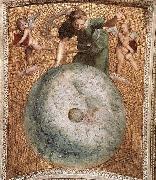
|
RAFFAELLO Sanzio
|
|||
|
|
|||
| Italian High Renaissance Painter, 1483-1520 Italian painter and architect. As a member of Perugino's workshop, he established his mastery by 17 and began receiving important commissions. In 1504 he moved to Florence, where he executed many of his famous Madonnas; his unity of composition and suppression of inessentials is evident in The Madonna of the Goldfinch (c. 1506). Though influenced by Leonardo da Vinci's chiaroscuro and sfumato, his figure types were his own creation, with round, gentle faces that reveal human sentiments raised to a sublime serenity. In 1508 he was summoned to Rome to decorate a suite of papal chambers in the Vatican. The frescoes in the Stanza della Segnatura are probably his greatest work; the most famous, The School of Athens (1510 C 11), is a complex and magnificently ordered allegory of secular knowledge showing Greek philosophers in an architectural setting. The Madonnas he painted in Rome show him turning away from his earlier work's serenity to emphasize movement and grandeur, partly under Michelangelo's High Renaissance influence. The Sistine Madonna (1513) shows the richness of colour and new boldness of compositional invention typical of his Roman period. He became the most important portraitist in Rome, designed 10 large tapestries to hang in the Sistine Chapel, designed a church and a chapel, assumed the direction of work on St. Peter's Basilica at the death of Donato Bramante, | |||
|
|
|||
|
Prime Mover new21/RAFFAELLO Sanzio-954527.jpg Painting ID:: 63801 |
1509-11 Fresco, 120 x 105 cm Stanza della Segnatura, Palazzi Pontifici, Vatican The figure bending in a beautiful scorcio over the celestial globe is a masterly example of perspective. Philosophically, this figure can be seen as an allegory of the beginning of the universe, but it might also be an embodiment of the science of astronomy. The constellation on the globe can be calculated exactly: the night of 31 October 1503, the date that Julius II was elected pope.Artist:RAFFAELLO Sanzio Title: Prime Mover (ceiling panel) Painted in 1501-1550 , Italian - - painting : religious | ||
|
|
|||
|
Also Buy::. For Following Paintings / Artists / Products, Please Use Our Search Online: |








